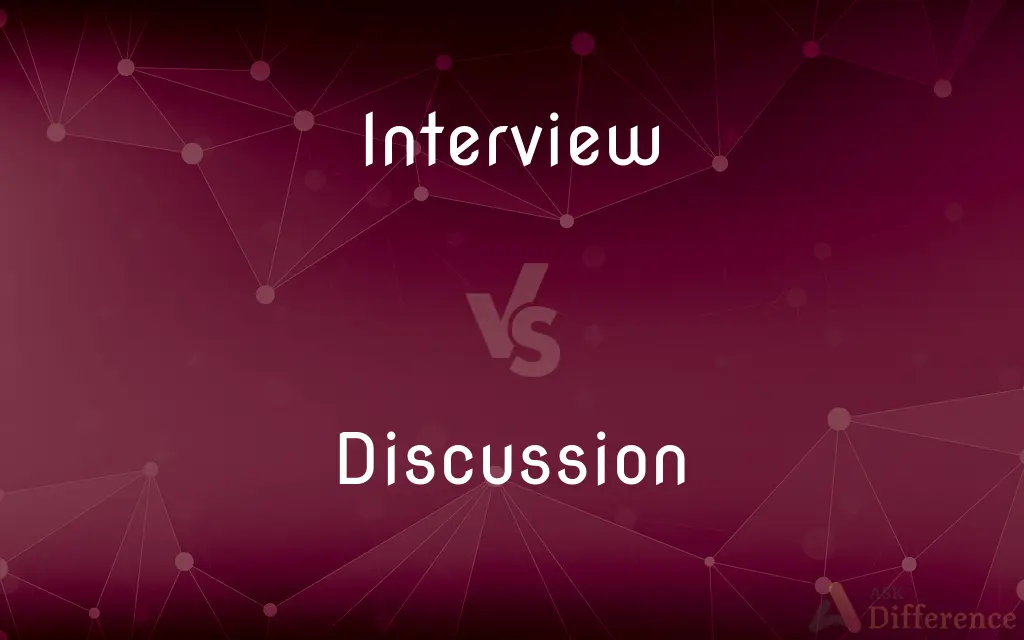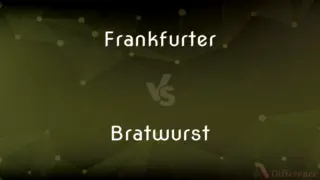Interview vs. Discussion — What's the Difference?
By Fiza Rafique & Maham Liaqat — Updated on March 14, 2024
An interview is a structured conversation where one party asks questions and the other provides answers, aimed at gathering information. A discussion is an informal conversation between two or more people where ideas and opinions are exchanged freely.

Difference Between Interview and Discussion
Table of Contents
ADVERTISEMENT
Key Differences
An interview typically involves a clear distinction between the interviewer and the interviewee, with the former leading the conversation by asking questions designed to elicit specific information or insights. In contrast, a discussion is characterized by a more egalitarian exchange of ideas and opinions among participants.
The dynamics of communication in an interview and a discussion differ significantly. In an interview, the flow of information is primarily unidirectional, from the interviewee to the interviewer, although follow-up questions can create a more interactive exchange. Discussions, however, involve multidirectional communication, with all participants contributing to and influencing the conversation.
Interviews are usually more formal and have a predefined structure, including a set list of questions or topics to be covered. Discussions, on the other hand, are typically less formal and may not have a strict agenda or predetermined questions.
Comparison Chart
Purpose
To gather information, assess, or understand perspectives
To exchange ideas, solve problems, or make decisions
Format
Structured, with a clear interviewer and interviewee role
Informal, with equal participation from all involved
ADVERTISEMENT
Communication
Unidirectional or with limited bidirectionality
Multidirectional, with open dialogue
Formality
Typically formal, with a predefined structure
Typically informal, with flexible structure
Outcome
Specific insights, assessments, or data collection
Exploration of ideas, consensus, or collective insights
Compare with Definitions
Interview
A formal conversation where questions are asked to elicit information from the interviewee.
She prepared thoroughly for her job interview to make a good impression.
Discussion
An informal conversation where ideas and opinions are exchanged among participants.
The team had a discussion to decide on the project's next steps.
Interview
Aims to gather specific information or insights from the interviewee.
The interview provided valuable data for the research project.
Discussion
Facilitates problem-solving, decision-making, or exploration of ideas.
During the discussion, they brainstormed several innovative solutions.
Interview
Often used for candidate selection, journalistic reporting, or academic research.
The journalist conducted an interview to uncover the story behind the new policy.
Discussion
Less formal and structured, allowing flexibility in the conversation flow.
The discussion veered into unexpected but fruitful topics.
Interview
Follows a predetermined set of questions or topics.
The interviewer had a list of questions to guide the conversation.
Discussion
Encourages equal participation and exchange of ideas among all parties.
Everyone contributed their thoughts and opinions in the discussion.
Interview
Led by the interviewer, focusing on the interviewee's responses.
The interviewer asked probing questions to get deeper insights.
Discussion
Leads to a collective understanding, consensus, or generation of new ideas.
The discussion ended with a clear plan of action agreed upon by all.
Interview
An interview is essentially a structured conversation where one participant asks questions, and the other provides answers. In common parlance, the word "interview" refers to a one-on-one conversation between an interviewer and an interviewee.
Discussion
The action or process of talking about something in order to reach a decision or to exchange ideas
The EC directive is currently under discussion
The committee acts as a forum for discussion
Interview
A meeting of people face to face, especially for consultation.
Discussion
Consideration of a subject by a group; an earnest conversation.
Interview
Hold an interview with (someone)
She was interviewed by a reporter from the Daily News
Police are keen to interview two men seen nearby
Discussion
A formal discourse on a topic; an exposition.
Interview
A formal meeting in person, especially one arranged for the assessment of the qualifications of an applicant.
Discussion
Conversation or debate concerning a particular topic.
There was then a long discussion of whether to capitalize words like "east".
This topic is not open to discussion.
My discussion with the professor was very enlightening.
Interview
A conversation, such as one conducted by a reporter, in which facts or statements are elicited from another.
Discussion
Text giving further detail on a subject.
Under each heading, you will find a discussion.
Interview
An account or a reproduction of such a conversation.
Discussion
The dispersion of a tumour.
Interview
(Informal) An interviewee
An actor who was a tough interview.
Discussion
The act or process of discussing by breaking up, or dispersing, as a tumor, or the like.
Interview
To obtain an interview from.
Discussion
The act of discussing or exchanging reasons; examination by argument; debate; disputation; agitation.
The liberty of discussion is the great safeguard of all other liberties.
Interview
To have an interview
Interviewed with a publishing company.
Discussion
An extended communication (often interactive) dealing with some particular topic;
The book contains an excellent discussion of modal logic
His treatment of the race question is badly biased
Interview
(obsolete) An official face-to-face meeting of monarchs or other important figures.
Discussion
An exchange of views on some topic;
We had a good discussion
We had a word or two about it
Interview
Any face-to-face meeting, especially of an official or adversarial nature.
Interview
A conversation in person (or, by extension, over the telephone, Internet etc.) between a journalist and someone whose opinion or statements he or she wishes to record for publication, broadcast etc.
The reporter gave the witness an interview.
Interview
A formal meeting, in person, for the assessment of a candidate or applicant.
It was a dreadful interview; I have no hope of getting the job.
Interview
An audition.
Interview
A police interrogation of a suspect or party in an investigation.
Interview
(transitive) To ask questions of (somebody); to have an interview.
He interviewed the witness.
The witness was interviewed.
Interview
(intransitive) To be interviewed; to attend an interview.
Interview
A mutual sight or view; a meeting face to face; usually, a formal or official meeting for consultation; a conference; as, the secretary had an interview with the President.
Interview
A conversation, or questioning, for the purpose of eliciting information for publication; the published statement so elicited.
Interview
To have an interview with; to question or converse with, especially for the purpose of obtaining information for publication.
Interview
The questioning of a person (or a conversation in which information is elicited); often conducted by journalists;
My interviews with teen-agers revealed a weakening of religious bonds
Interview
A conference (usually with someone important);
He had a consultation with the judge
He requested an audience with the king
Interview
Conduct an interview in television, newspaper, and radio reporting
Interview
Discuss formally with (somebody) for the purpose of an evaluation;
We interviewed the job candidates
Interview
Go for an interview in the hope of being hired;
The job candidate interviewed everywhere
Common Curiosities
Why is formality important in an interview?
Formality sets expectations and helps maintain focus on the interview's objectives, ensuring relevant information is obtained.
Is it possible for an interview to become a discussion?
While interviews are more structured, they can sometimes evolve into discussions, especially in informal settings or with follow-up conversations.
How does the structure of an interview differ from that of a discussion?
Interviews have a predefined structure and set questions, while discussions are more flexible and open-ended.
What is the main purpose of an interview?
The main purpose is to gather information, assess a person's suitability, or understand their perspective on a specific topic.
Can discussions lead to decision-making?
Yes, discussions often aim to solve problems or make decisions through collective input and dialogue.
Is preparation necessary for an interview or discussion?
Preparation can enhance both, but it's particularly important for interviews to ensure that the questions align with the objectives.
Can anyone lead a discussion?
Yes, discussions are characterized by equal participation, though a moderator can help guide the conversation and ensure everyone's input is heard.
What skills are important for conducting an interview?
Skills such as listening, questioning, and the ability to guide the conversation are crucial for conducting effective interviews.
How can discussions enhance problem-solving?
By bringing together diverse perspectives and encouraging open dialogue, discussions can lead to creative solutions and consensus.
How do participants in a discussion benefit from the exchange?
Participants can gain new insights, understand different perspectives, and contribute to collective outcomes.
Share Your Discovery

Previous Comparison
Intestine vs. Gut
Next Comparison
Frankfurter vs. BratwurstAuthor Spotlight
Written by
Fiza RafiqueFiza Rafique is a skilled content writer at AskDifference.com, where she meticulously refines and enhances written pieces. Drawing from her vast editorial expertise, Fiza ensures clarity, accuracy, and precision in every article. Passionate about language, she continually seeks to elevate the quality of content for readers worldwide.
Co-written by
Maham Liaqat















































